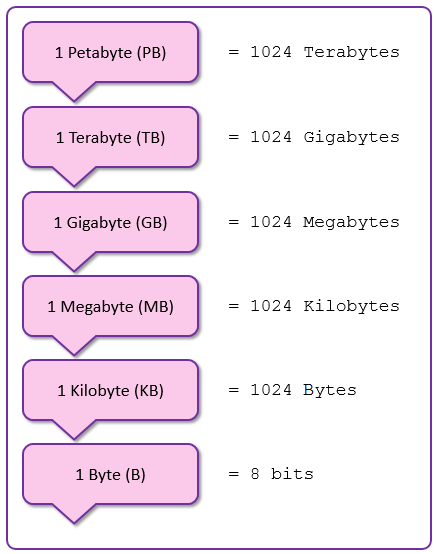Everything in the world could be measured using some parameter. Like 1 liter of water or 1 kilogram of salt, etc. But But there are the things which one can’t feel and touch with our own hands? Emotions of human are one such thing, but in this blog, we will talk about the data stored in your computer.

You know, how much is 1 MB or GB of memory. But you can noy hold it in your hands. As doing this involves easy but lengthy calcuation.
Let learn with the basic of computer memory –
Bit – It is smallest measurement of computer memory. A bit can be either 1 or 0.
Byte – 8 bits combine to make 1 byte and byte is the basic unit of memory. One alphabet can be assumed as 1 byte. Computersolve is made up of 13 alphabets so it will be 13 bytes in size.
Kilobytes – To make one unit of kilobytes, you need 1024 bytes.
Assume 100 words para with each contain 5 characters. So 1 Kb can be approximately measured as 2 paragraphs.
Megbytes – 1024 kilobytes or 1,048,576 bytes make up a megabyte or MB.
So, continuing our paragraph measurement, 1 MB or 1,048,576 bytes would be around:
- 2,097 paragraphs of 100 words.
- A book of 419 pages each have 5 paragraphs which means 2500 characters/page.
Gigabyte – 1,073,741,824 bytes or 1024 megabytes make up a gigabyte or GB. So, it’ll be:
- 429,497 pages containing text only.
- 682 images of 1.5 MB each.
- 859 books of 500 pages each.
- 204 songs of 5 MB each.
Terabyte – 1,099,511,627,776 bytes or 1,024 gigabytes make up a terabyte or TB. It is:
- 5 paragraphs in 439,804,651 of 100 words each.
- 500 pages in 879,609 books
- 64 PD of 16 GB each.
- 699,050 images of 1.5 MB each.
- 209,715 songs of 5 MB each.
After terabyte, further storage sizes are:
- 1,125,899,906,842,624 bytes = 1 Petabyte (PB)
- 1,152,921,504,606,846,976 bytes = 1 Exabytes (EB)
- 1,180,591,620,717,411,303,424 bytes = 1 Zettabyte (ZB)
- 1,208,925,819,614,629,174,706,176 bytes = 1 Yottabyte (YB)
You can use your computer to calculate more. The limitations of terabyte data are not complete at the user level. However, a company like Google can pass Exabyte Signal through 8 or 10 because it is the largest data center in the world.
Commons Confusions:
The KB — KiB confusion
One common misconception among people is that they think 1 Megabyte (MB) = 1,024 Kilobyte (KB), but it is not. 1 MB = 1,000 KB.
The binary conversion, 1,024 bytes = 1 KiB (KibiByte), 1024 KiB = 1 MiB (MebiByte), and so on.
The decimal conversion, 1,000 bytes = 1 KB (KiloByte), 1,000 KB = 1 MB (MegaByte), and so on.
In this article, Computersolve.com have inclined myself to what is normally assumed i.e. 1 KB = 1024 bytes. Sticking to the actual conversion would lead to more confusions.
The storage medium uses 1 KB = 1000 decimal bytes. Therefore, the above calculation will be different if we consider the current UN. For example, a 4.7 GB DVD = 4700 MB.
The operating system on our computer calculates the KB and MiB file sizes, but displays them in KB. It creates confusion. This is why your device on Windows looks small. This shows 1,048,576 bytes = 1 MB, which is actually 1 MB. Apple started using 1,000,000 bytes = 1 MB conversion standard with OS X 10.6.
The KB — Kb confusion
There is another confusion between b and b. When we write kb is kilobytes and for kb is kilobytes. “Bit” is used when talking about network speed. For example, 500 Kbps. Switches are used when talking about the size of computer memory. For example, 500 KB.
This chaos destroys the cells in our brain. In fact, you can forget everything I mentioned above if it is not in the mind and continue to believe what you have so far.